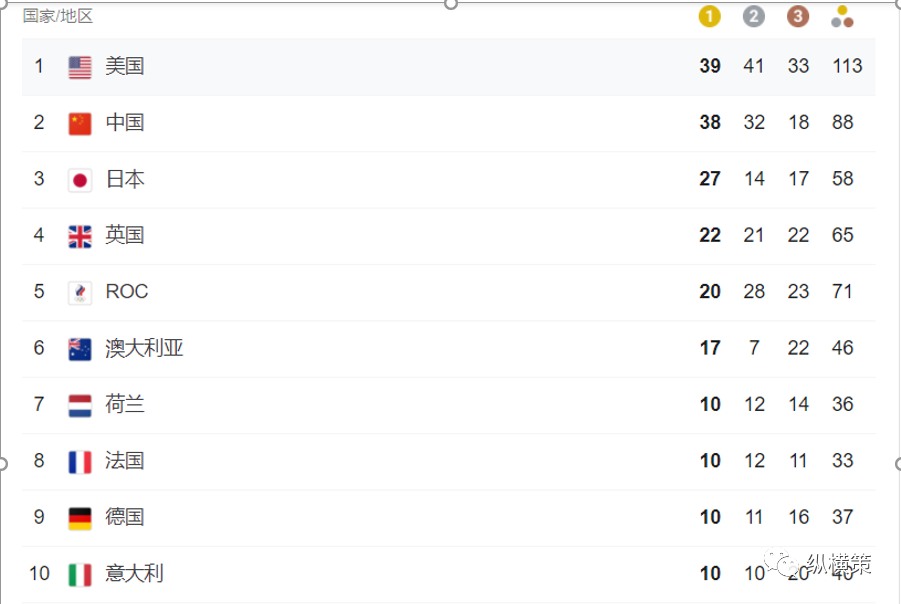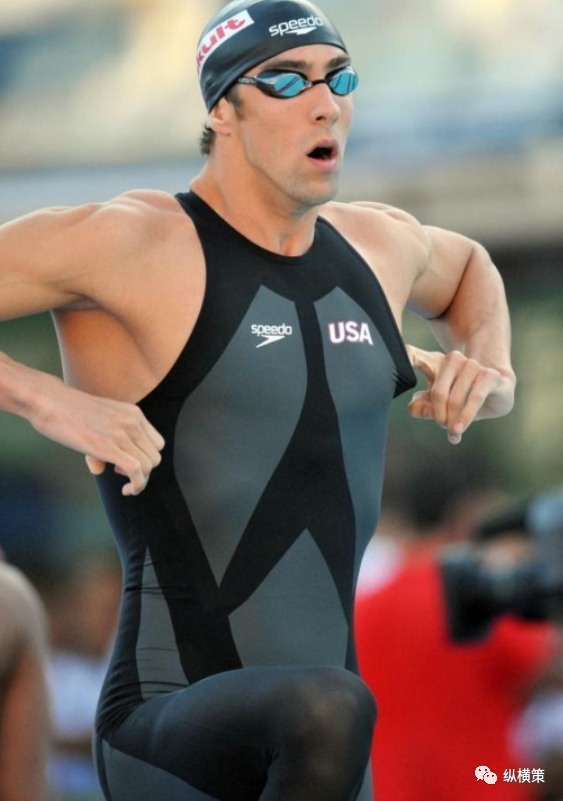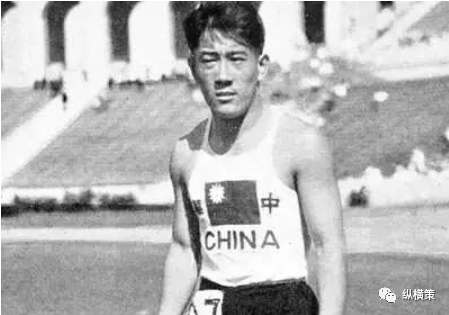Our slogan is
“Connecting China and Europe, harmonizing the world”
The Tokyo Olympics in full swing has come to an end, and first of all, congratulations to the Chinese team for finishing second with 38 gold medals and a total of 88 medals. It is worth mentioning that this result is also the second best result after the Beijing Olympics since China participated in the modern Summer Olympics, and basically the same as the London Olympics.
With all kinds of melons coming out about this year's Olympic Games, ZonghengCe would like to focus on a few issues to share some thoughts and reflections:
I. The medal table and the politics of the Olympics
As we all know, up to the day before the end of the Olympic Games, the Chinese team had maintained the first place in the gold medal table until the last day when the United States took the lead, so what does the Olympic medal table actually mean? And what is the significance of the Olympics? Firstly, let's look at the normal order of the medal table for this year's Olympics.

Next, I'll be cheeky and imitate the American way of doing things - it must be stressed that under the "One China" principle, we actually have two smaller numbers.


So, China's final results should be: 41 gold, 38 silver and 27 bronze for a total of 106, placing it first in the gold medal table ...... After a good time, a hint of contempt for itself immediately sprang up, after all, it is a disgusting thing to put moral standards on the same level as the British and American mainstream media.
In other words, the Olympic Games are about a country's overall national power, and the Olympic gold medal list is the world catwalk. This is so for three reasons.
1. the Olympic Games are an economic competition, and placing in each sport requires a stable domestic environment and strong infrastructure investment, but the investment behind achieving top overall results is unimaginable, let alone for athletes from war-torn countries like Iraq and Syria, where placing is even more difficult.
2. the Olympic Games are a technological competition, from sports equipment to training methods to drug development, all of which are beyond the means of the average country. Do you know why records are constantly being set at the Olympics? It is because of the various technological advances mentioned above. From the shark suit worn by Phelps, who won 8 gold medals in Beijing in 2008, to the wind tunnel technology used by Chinese swimmers and rowers to train in the current Olympics ......, it is easy to see that with technological iteration and technological monopoly, future Olympic medals will also be more concentrated in the strongest comprehensive countries.

Phelps' shark suit
3. The Olympics are a political competition, and here there are two main aspects - standard setting and the power to impose penalties. Standard-setting, including doping sanctions and the addition or removal of events, and the power to impose penalties (including the right to appeal) are directly linked to international discourse, and in the most exaggerated cases can lead to a country's Olympic berth being cut. For example, the Russian Olympic Team (ROC) at this year's Olympic Games is in fact a private organisation, and Russia has been sentenced by the International Anti-Doping Federation to a two-year ban on competing in international competitions on behalf of the country. Of course, I don't want to get into the details, but it is clear that Russia lost badly in this round of games. For example, in 2016, Russian hackers hacked into the IOC's data, which was rumoured to show that a surprisingly high percentage of US athletes suffered from "asthma", and that the drugs used to supposedly treat "asthma" contained doping ingredients, while the US was not sanctioned by the International Anti-Doping Federation. The United States was not heavily sanctioned by the International Anti-Doping Federation.
In short, during the Cold War, the top two gold medalists in the Olympics were almost always dominated by the two superpowers, the US and the USSR. This time in Tokyo, no one will think that China's first or second place finish is a misnomer, will they? This means that most countries around the world have openly acknowledged that China is a superpower whose combined power is comparable to that of the United States. Referring to the top ten countries in the current Olympic gold medal list, it is easy to see that they are almost positively correlated with the country's overall power. There is, of course, one special case.

This means that India's boast of its overall power is not quite as strong as it should be. Incidentally, in Aamir Khan's famous Hindi film "Wrestlemania", the "World Wrestling Championship", which was supposedly "for the glory of the country", was actually just the In the film "Wrestling for the Nation" by Aamir Khan, the "World Wrestling Championships" are in fact only the "Commonwealth Games", which are more than one level away from the Olympic Games.
II. On the "national system
Every time there is an Olympic Games, Chinese and foreign public opinion inevitably talks about China's so-called "nation-raising system", and leaving aside the double-standard British and American media, in fact we ourselves often discuss this term.
In the opinion of Zonghengjun, there is a clear problem with this statement. Popular and niche sports cannot be lumped together in a "national system". For China, table tennis and badminton are naturally the "national system", i.e. there is a large number of people participating and the government is investing a lot, so the natural result is that they are the strongest in the world. There are many minor sports that are only "governmental" and do not have a broad base in the private sector, but the investment and training of provincial and national teams is first class, and there is no shortage of strong sports in China, such as diving and weightlifting.
The relationship between the "national system" and the "government system" is that the latter is a necessary condition and the former is a sufficient condition. In other words, any country that wants to place well in an Olympic sport must have a strong government (or club) commitment in order to receive professional training, and the idea that "foreign countries are playing to win Olympic gold" is very nonsensical. It is true that there are 'popular sports' and 'professional sports', and although the Olympics are a 'popular sport', the athletes who compete in the Olympics are actual professionals. Although the Olympics are a "popular sport", the athletes who compete in the Olympics are actual professionals.
In the view of Zonghengjun, the term "national system" is actually a positive one. The significance of the Olympic Games on a social level is also to increase the participation of the general public in a wider range of sports. Only through a two-pronged approach of "universal participation" and "government input" can more "national ping" and "national feather" athletes be created. Only through a combination of "universal participation" and "government input" can more "national ping" and "national feather" be created.
III. On the issue of bias and Olympic 'sphere of influence'
The most criticized issue of the Tokyo Olympics is probably the "blind referee" problem, which is directly following the Seoul Olympics in 1988. Even the netizens of the most powerful country in the universe are lamenting that "you are allowed to imitate, but not to surpass".
As for the issue of bias in refereeing, the cross-sectional judge believes that
It is an established custom that the judges at all Olympic Games are more or less biased in favour of the host country. A small experiment can be conducted: pick a country that has hosted the Olympics and compare the medal positions of its host games with those of other games, and you will find that generally the host country's home results are significantly better than those of the away games. In this sense, it is rare for China to get such a good ranking on the road this time. Of course, it can't be too much, otherwise it would be the current Tokyo Olympics ......
In addition, the Olympic powers have traditional strengths, similar to "spheres of influence" in the field of international security. Generally speaking, they are almost invincible in their traditional areas of strength, such as basketball and athletics in the USA, table tennis and badminton in China, swimming in Australia and curling in Canada. This also means that any 'encroachment' by athletes from other countries into the spheres of influence of these powerhouses is likely to cause a huge backlash from the target country.
This leads to the next question - how can China best demonstrate its national strength through the Olympics in the future? The answer is to maintain its traditional strengths and continue to "eat into" the spheres of influence once "monopolised" by countries such as the US, Europe, Japan and Australia. The impact of such achievements will be far greater than one might think. For example, why was Su Bingtian's sixth-place finish in the 100m sprint final at this year's Olympic Games so highly regarded? Because he broke the black monopoly and made new history for the yellow race; and why did Yao Ming achieve what he did? It is because he broke the monopoly of the Americans in basketball.
It is believed that China will blossom in various Olympic sports in the future and become a "hexagonal warrior" at national level.
IV. About the Olympics and China's future
Firstly, the "entertainment of sport" marks the maturation of Chinese society. There has been a very significant change in Chinese public opinion at this year's Olympics - the audience has become much calmer and is no longer as mean-spirited as it was towards Liu Xiang, who withdrew from the Games. Rather, from official to private, the court of public opinion has at every turn been one of praise, understanding and encouragement for the Chinese players, and even when dealing with outrageous injustices, it has mostly been in the form of sarcastic banter. In contrast to the attitude of the Chinese crowd, Italy and Latin America have a glorious history of gangs offering bounties to hunt down "black referees" ......
The Olympics represent a step forward in China's transition from the "national glory of sport" to the "entertainment of sport". It means that Chinese people no longer need to derive national honour from the achievements of sports stars, because at this moment, there are three lovely Chinese astronauts on the Tiangong space station, our fleet in the South China Sea has just casually chased away Britain's HMS Queen Elizabeth, and we are the largest trading partner of more than 130 countries in the international trade arena. The partner ...... has so much to offer Chinese people to show their sense of national honor, and with this bottom line, we can let our Olympic athletes "return the sport to the sport". In the future, Chinese professional sports athletes will be able to solve the problem of their exit after retirement perfectly by virtue of the creation of their personal IP. Looking back at the first Chinese athlete to compete in the Olympic Games, as well as those athletes from other countries who had to go through hardships due to national turmoil or poverty to get to the Olympic Games this year, we are overwhelmed with emotions.

Liu Changchun, the first Chinese athlete to compete in the Olympic Games in 1932, the 10th Olympic Games
Secondly, the Chinese way of raising athletes has given children from the lower classes a new path to success. This year's "Dingliu" was the 14-year-old diving champion Quan Hongchan, who scored a perfect score in three dives, and the foreign coaches would be trembling with envy and jealousy if they realised that the young girl could compete in at least four more Olympic Games. Quan Hongchan is the embodiment of the "golden phoenix from a chicken's nest", opening another door of hope for those Chinese children who come from poor backgrounds, but are able to work hard and have talent. In other words, the road to sport can be seen as an alternative to the college entrance examination (imperial examinations).
V. The national strategy behind the Olympics
While the Olympic Games were in full swing, the State Council released the National Fitness Plan (2021-2025). The introduction of the latter was the country's way of taking advantage of the Tokyo Olympics to reveal certain major strategic intentions. The successive implementation of several major initiatives such as the National Fitness Plan, the opening up of the third child, the focus on combating extra-curricular training institutions and the integration of technical and cultural education means that the central government is laying out China's future demographic and talent strategy, aiming to alleviate the problems of an ageing population, the sub-health of the working population, the declining fertility rate and the shortfall in universal health care and pension insurance. The National Fitness Programme is intended to fundamentally improve the physical fitness of the Chinese people in the future through universal fitness and sports for all. In other words, in the future, our "national system" may no longer be limited to bing and feather, but each sport will form a large group of enthusiasts, which is also an opportunity for capital.
|
Prev:The new AUKUS alliance exposes the internal structural contradictions of the West
Next:Reflections on the "Baltic Death Dealers"--Lithuania's Anti-China Acts |
Return |
Link :
Copyright : ZONGHENGCE Strategy Insitute(ZHC)
Technical support: Yunding Data